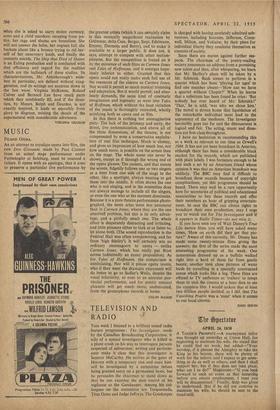As an attempt to translate opera into film, the new
Don Giovanni, made by Paul Czinner from an actual stage performance under Furtwangler at Salzburg, must be counted a failure. It opens with an apologia, that it aims to preserve a particular live performance by the greatest artists (which it can certainly claim in this musically magnificent realisation by Grammer, della Casa, Berger, Sicpi, Edelmann, Ernster, Dermota and Berry), and to make it available to a larger public. It does not, it says, attempt to compete with other motion- pictures. But the competition is forced on it by the existence of such films as Carmen Jones and Tales of Hollinann, and it emerges hope- lessly inferior to either. Granted that this opera could not easily make such full use of
the resources of the cinema as Carmen Jones.
Nor would it permit so much musical trimming and adaptation. But it would permit, and abso- lutely demands, the same kind of cinematic imagination and ingenuity as went into Tales of Hoffman, which without the least violation of the music is thoroughly recreated, wholly satisfying both as opera and as film.
In this there is nothing but unimaginative piety. The lack of the intimacy and unity, the direct, live communication, and above all of the three dimensions, of the theatre, is not compensated by even a conservative exploita- tion of real film technique. Much is clumsy, and gives an impression of how much less, not how much more, is possible on the screen than on the stage. The whole scene can never be shown, except as if through the wrong end of the opera glasses. The camera, and that means the screen, fidgetily follows one or two singers at a time from one side of the stage to the other, like a spotlight, always wanting to get them into the middle. It often shows the one who is not singing, and in the ensembles does not always manage to include all the singers, or even the one who at the moment dominates. Because it is a pure theatre performance photo- graphed, the static arias seem less unnatural than in Carmen Jones, where they are the one unsolved problem, but this is its only advan- tage, and a pitifully small one. The whole effect is desperately distracting and irritating, and little pleasure either to look at or listen to, let alone both. (The sound reproduction in the Festival Hall was often overpowering, and far from 'high fidelity;). It will certainly win no ordinary cinemagoers to opera — unlike Carmen Jones, which has really put Bizet across (admittedly an easier proposition). As for Tales of Hoffmann, the comparison is annihilating. Nor will it please opera lovers, who if they want the dramatic enjoyment will do better to go to Sadler's Wells, despite the vocal inferiority, or even to an amateur pro- vincial performance, and for purely musical pleasure will get much more, undistracted, from the gramophone records at home.










































 Previous page
Previous page